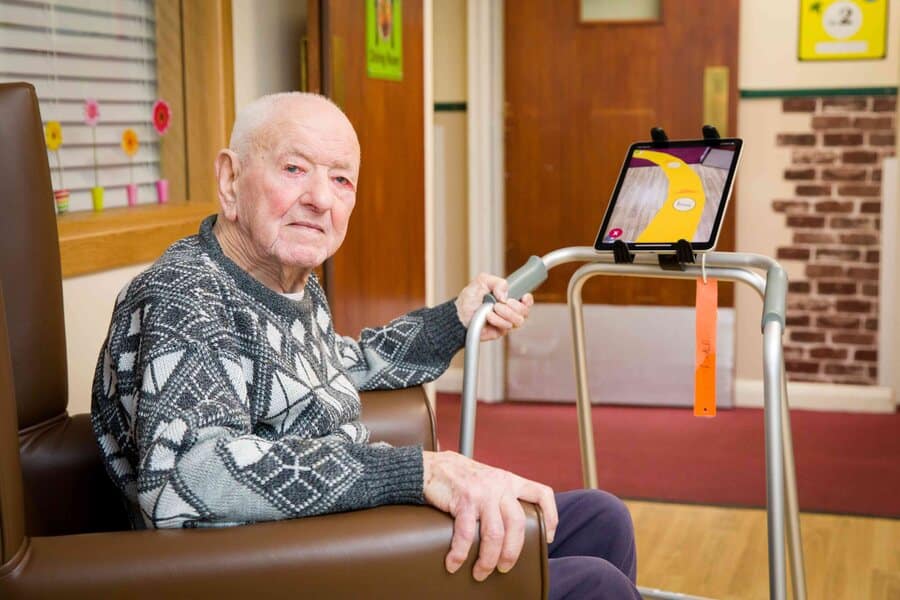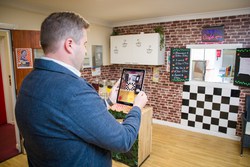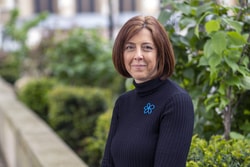Innovators working on projects to transform living with dementia awarded £1.9m by Longitude Prize on Dementia

The semi-finalists of The Longitude Prize on Dementia, an award funded by Alzheimer’s Society and Innovate UK, to support the development of technologies for people living with dementia, have been announced.
Innovations created by the 24 semi-finalists have been designed for people living with dementia to help them remain independent for longer and keep doing the things that bring them fulfilment.
They include an app that helps people living with dementia communicate, high-tech facial recognition glasses to identify familiar faces, and an augmented reality map to help people safely find their way around their area.
The semi-finalists will each receive £80k grants as part of the overall £4m Longitude Prize on Dementia driving the co-creation of personalised technologies to help people living with dementia enjoy independent and fulfilled lives.
A total of £1.9m was awarded to 24 pioneering teams of developers, researchers and innovators from across the globe in the international challenge competition funded by Alzheimer’s Society and Innovate UK, and designed and delivered by Challenge Works.
Discovery Awards of £80k have been awarded to teams in the UK, USA, Canada, Australia, UAE, Colombia, Portugal and the Isle of Man to develop new technologies to improve the lives of people living with dementia.
The teams will now work alongside people living with dementia and their carers to ensure technologies are intuitive, easy-to-use and able to adapt to their changing needs.

Innovations include an augmented reality map to prevent people getting lost or confusedDepartment of Housing, Local Government and Heritage – The Dorothy Community from Care City (UK) is a digital “Yellow Brick Road” map that uses augmented reality to provide virtual directions, visualised pathways and simple instructions for people living with dementia to independently navigate their local community.
Another innovation is high-tech specs for facial recognition. iMAGIC smart glasses are being developed by Khalifa University (UAE) to help people recognise familiar faces, provide reminders and alerts, zoom in and out to facilitate navigation, make phone calls to loved ones and monitor vital signs. The glasses will also eventually be able to help identify objects that sport a QR code (a type of barcode that can be scanned and interpreted by computer software).
Meanwhile, a virtual speech assistant app to fill in missing words – the interactive AI software from Amicus Brain Innovations (USA) will use speech and language processing to listen to “broken speech” – a common challenge as dementia advances – and speak aloud the AI’s “repaired” rendition of what the user intended to say.
Kate Lee, CEO at the Alzheimer’s Society, said: “It’s vital people with dementia are able to live independently, doing things that bring them fulfilment, for as long as possible. And that’s exactly what tech innovation can provide.
“Today’s Discovery Award winners all have the capacity to develop cutting-edge tools that bring hope to the here and now, making a tangible difference to people’s lives.
“New drugs have been discovered which slow the progression of early Alzheimer’s disease, but there’s still more to do. Alzheimer’s Society remains committed to innovative projects like the Longitude Prize so that together we can improve the lives of people living with dementia and their families.”
Indro Mukerjee, CEO at Innovate UK said: “By addressing dementia the Longitude Prize tackles a global health crisis. Worldwide, around 50 million people have dementia and there are nearly 10 million new cases every year.
“Innovate UK is pleased to support this initiative along with the other vital work we are doing in this area. The UK is a global leader in innovation for healthy ageing and this prize will incentivise new technologies. This will help people with dementia, their families and their carers, to make living with the condition easier”.
The Longitude Prize on Dementia is driving the development of personalised, technology-based tools that are co-created with people living with the early stages of dementia, helping them live independent, more fulfilled lives and enable them to do the things they enjoy. This year, the prize received over 175 applications from all over the world.

The competition itself has also been co-designed with people living with dementia. Judges were advised in their decision making by the prizes Lived Experience Advisory Panel (LEAP).
In 2024, five finalists will progress with additional £1.5m in funding to build real-world prototypes. In total, more than £3 million will be awarded in seed funding and development grants with a £1 million first prize to be awarded in 2026.
In addition, wider expert non-financial support has been funded to provide innovators with crucial insight and expertise in the next three years, such as access to data, specialist facilities, collaborations with people living with dementia and expert advice on technical and business aspects of the innovation and to facilitate knowledge sharing between participants.


